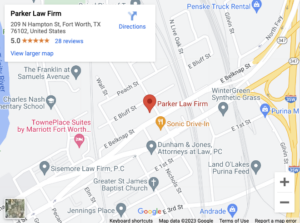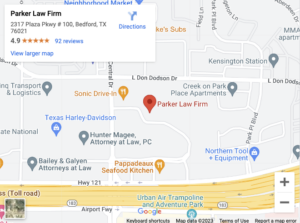
Personal injury law is designed to protect you if you or your property suffer harm because of someone else’s negligent actions or failure to act. It’s important to understand what leads to a personal injury claim, how they work, and what you need to do to be successful.
Common Scenarios Leading to a Personal Injury Claim
Personal injury cases can arise from a variety of situations.
Some common scenarios include:
- Car accidents
- Slip and fall accidents on someone else’s property
- Medical malpractice
- Injuries caused by defective products
- Dog bites
- Workplace accidents
- Wrongful death
In each of these scenarios, the injured party may have a valid claim for damages if they can prove that the injury resulted from someone else’s negligence or intentional actions.
Steps Involved in a Personal Injury Case
Understanding the steps you need to take after being injured is crucial to a successful personal injury case. Here’s what you need to do:
Seek Medical Attention
Your health should be your number one priority. If you’ve suffered an injury, seek medical treatment as soon as possible. This is important not only for your well-being, but it also helps document your injuries and serves as evidence should you decide to pursue a claim.
Consult a Personal Injury Lawyer
Reach out to an experienced personal injury lawyer who can evaluate your claim and guide you through the legal process.
Personal injury lawyers often work on a contingency fee basis, meaning you won’t have to pay them upfront, and they will only get paid if they successfully recover compensation for you.
Investigate Your Claim
Your lawyer will gather evidence such as police reports, medical records, and witness statements to build your case.
File a Claim with the At-Fault Party’s Insurance Company
Your attorney will help you file an insurance claim. This will involve submitting a demand letter detailing your injuries, costs incurred, and the desired compensation amount.
Negotiate a Settlement
Your lawyer and the insurance company will negotiate to reach an acceptable settlement. If they cannot reach an agreement, the case may proceed to trial.
File a Personal Injury Lawsuit
If negotiations do not result in a satisfactory settlement, your attorney may file a lawsuit to ensure you receive appropriate compensation for your injuries.
The exact steps and process of your claim will vary depending on the circumstances, but this is generally what to expect.
Proving a Personal Injury Claim: The Four Elements of Negligence
Central in personal injury cases is determining who exactly was at fault. This process typically involves identifying negligence, which means failing to exercise reasonable care under given circumstances.
To be successful, you must prove the following four elements:
- Duty of Care: The defendant had a legal responsibility to act reasonably and safely to avoid causing harm to others. For example, drivers have a duty to obey traffic laws and follow the speed limit.
- Breach of Duty: The defendant violated their duty by acting negligently or intentionally. In the example above, the breach could be a driver who runs a red light.
- Causation: The defendant’s breach directly caused the plaintiff’s injuries. In the driving example, it becomes essential to prove that the defendant running the red light led to the accident and the plaintiff’s subsequent injuries.
- Damages: The plaintiff must demonstrate that they suffered losses (e.g., medical expenses, lost wages, pain, and suffering) as a result of the defendant’s actions.
Each element must be proved by a “preponderance of the evidence,” which essentially means that it is more likely than not that the allegations are true.
Statute of Limitations in Texas Personal Injury Cases
In Texas, the statute of limitations for personal injury cases is generally two years. This means that you have a period of two years from the accident date to file your lawsuit in court.
If you fail to do this, you will lose your chance to recover compensation.
The deadline to file certain cases might be extended or shortened depending on specific circumstances. For example, claims against government entities often require notice much sooner and have a shorter deadline overall.
It’s crucial to obtain legal advice as soon as possible to ensure your claim is filed within the proper time frame and that you don’t jeopardize your recovery.
Types of Damages Available in Texas Personal Injury Cases
There are three primary types of damages available through a personal injury lawsuit:
Economic Damages
These compensate for concrete financial losses incurred as a result of the accident. Economic damages might cover medical expenses, lost wages due to missed workdays or reduced earning capacity, and property damage repair costs.
Non-Economic Damages
These damages account for more abstract consequences such as pain and suffering, emotional distress leading to depression and anxiety, and a loss of enjoyment of life.
Punitive Damages
Sometimes an offender’s actions are so egregious that the courts award punitive damages to punish them. These damages are also used to discourage similar behavior in the future.
The exact type and amount of damages you are entitled to are very case-specific. A personal injury attorney can help you determine what you may deserve under Texas law.
How a Texas Personal Injury Lawyer Can Help With Your Case
A lawyer can provide indispensable help, especially in situations that require a deep understanding of legal procedures and terminologies. Here’s how:
Provide Legal Advice
Lawyers have extensive knowledge of the subtleties of the law, making them credible sources for advice. They can guide you through complex matters and ensure you take the right steps.
Complete Documentation and Paperwork
Piles of legal documentation could easily overwhelm you if unassisted. Lawyers shoulder this burden effectively by drafting accurate documents and making sure everything is filed on time so you don’t miss out on your chance for compensation.
Representation in Court
Having a professional speak on your behalf at all hearings and potentially at trial is incredibly important. They will fight for your rights while ensuring all rules are followed.
Contact Our Fort Worth Personal Injury Lawyers for Help With Your Case
If you’re facing an injury and believe someone else is responsible, reach out to a lawyer from Parker Law Firm Injury Lawyers for help. Contact us today to schedule a free consultation with an experienced Fort Worth personal injury attorney at (817) 503-9200.


